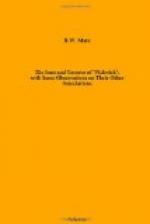Now all these little untoward events happened whilst Mr. Pickwick was staying at the “Angel,” and. not only have they caused much amusement to the readers of the book, but incidentally have added fame and importance to the “Angel” at Bury to such an extent that the faithful reader of Pickwick who finds himself in the neighbourhood would no more think of passing the “Angel” than would the pilgrim to the town omit visiting the famous abbey. He will find the hotel little altered since the day when Mr. Pickwick visited it, either as regards its old-time atmosphere or its Victorian hospitality.
It is a very plain and severe-looking building from the outside, suggesting a gigantic doll’s house with real steps up to the front door all complete. Although it does not look as inspiring on approaching it as most Dickensian inns do, its interior, nevertheless, makes up in comfort what its exterior lacks in picturesqueness.
It has stood since 1779 and occupies the site of three ancient inns known at the time as the “Angel,” the “Castle” and the “White Bear,” respectively. In such an ancient town as Bury St. Edmunds, with so many years behind it, the “Angel” could tell a story worth narrating. Fronting the gates of the ancient Abbey, it occupies the most prominent place in the town. In the wide space before it the Bury fair was held, and a famous and fashionable festivity it was, which lasted in the olden time for several days. Latterly, however, one day is deemed sufficient, and that is September 21 in each year.
In spite of its sombre appearance from the outside, it is considered one of the most important hotels in West Suffolk, and is still a typical old English inn, “a byword for comfort and generous hospitality throughout the eastern counties.” The spacious coffee-room, its well-appointed drawing and sitting-rooms, its many bedrooms, have an appeal to those desiring ease rather than the luxuriousness of the modern style. In addition it has extensive yards and stables, survivals of the old posting days, with a cosy tap-room and bar, to say nothing of all the natural little nooks and corners and accessories which pertain only to old-world hostelries.
There still remains the pump under which Sam had his “halfpenny shower-bath.” And in the tap-room one can be easily reminded of the scene over which Sam presided and acquitted himself with so much satisfaction.
As to which was the room occupied by Mr. Pickwick, history is silent; but when Dickens was on his reporting expedition in Suffolk during the electoral campaign of 1835, he stayed at the “Angel” and, tradition says, slept in room No. 11. Mr. Percy FitzGerald, on visiting it some years ago, ventured to seek of the “gnarled” waiter information on the momentous question of Mr. Pickwick and his adventure.
“Piokwick, sir? Why, he knew all about it,” was the reply. “No. 11 was Mr. Pickwick’s room, and the proprietor would tell us everything. A most quaint debate arose,” says Mr. FitzGerald, “on Mr. Pickwick’s stay at the hotel. The host pronounced ex cathedra and without hesitation about the matter. . . . The power and vitality of the Pickwickian legend are extraordinary indeed; all day long we found people bewildered, as it were, by this faith, mixing up the author and his hero.”




